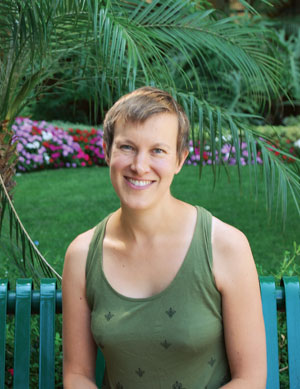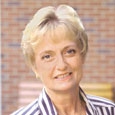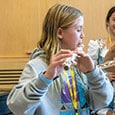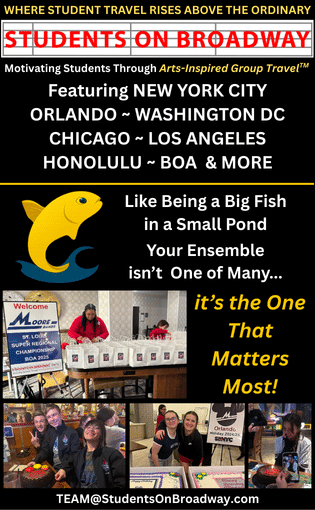 Molly Barth grew up on East Coast, was one of the founding members of eighth blackbird and now teaches at the University of Oregon. She is an Oberlin College-Conservatory graduate with a Master of Music degree from Northwestern University and an Artist Diploma in Chamber Music from the University of Cincinnati College-Conservatory. Her principal teachers include Michel Debost, Kathleen Chastain, Randolph Bowman, Bradley Garner, and Walfrid Kujala. She has taught at Willamette University and held residencies at the University of Chicago and the University of Richmond in Virginia.
Molly Barth grew up on East Coast, was one of the founding members of eighth blackbird and now teaches at the University of Oregon. She is an Oberlin College-Conservatory graduate with a Master of Music degree from Northwestern University and an Artist Diploma in Chamber Music from the University of Cincinnati College-Conservatory. Her principal teachers include Michel Debost, Kathleen Chastain, Randolph Bowman, Bradley Garner, and Walfrid Kujala. She has taught at Willamette University and held residencies at the University of Chicago and the University of Richmond in Virginia.
Barth grew up in the small town of Cornwall-on-Hudson, New York, about an hour north of New York City in an average, non-musical family. She started flute in the school band system at about age 9. “I had braces on at the time, so my choices were flute or percussion. My band director desperately wanted me to play percussion because I think she had other people in mind to fill the flute section, but I insisted that flute was my first choice.”
When asked if her sound was fuzzy because of the braces, she replied, “Because I had braces on before starting flute, I learned the flute with them. What scared me was when it was time for the braces to come off, but it worked out well.
“The music system was very small in my high school, and although the band director, Victor Esposito, was a great inspiration to me, I can’t really cite any outside influence in my upbringing that made me a musician. My parents weren’t musicians, the band programs were fine but not remarkable; there was just something that really interested me about music.
“When I was in fifth grade and we had the elementary school version of All State and All County, my band director did not choose me for it, for good reasons I am sure, but it really hurt. It was the first time that I had felt such passion for something, and I think that started feeding my desire to excel.”
During her high school years, when she was old enough to travel into New York City, she entered the Manhattan School of Music Preparatory Division and studied flute with Harold Jones for two years before college.
“It was at Tanglewood that I really decided to be a musician. I went to the Boston University Tanglewood Institute summer masterclass program with Doriot Dwyer and Leone Buyse. I don’t think I really understood what it meant to be a professional musician until I got there and listened to Boston Symphony and Tanglewood Music Center Orchestra concerts. It really kicked me into a higher gear. I had been practicing maybe an hour and half a day; after I left there I was playing five hours a day.”
Oberlin
When it was time to choose a college, Barth did what most high school seniors do. “I auditioned at a bunch of schools and took short lessons with each of the teachers. My lesson with Michel Debost at Oberlin was wonderful. I knew that he would be good for me.” She chose Oberlin, although she had some reservations about coming from New York to such a small community. “From day one there it was fabulous. Debost was a wonderful teacher, and I learned so much from him. The amount of motion that I had in my embouchure was a problem, and we really worked to correct that. He brings such an awareness to every note that a person plays. Every note that I play, I hope, has intention, from when I am alone in a practice room playing long tones to when I am on stage in a performance, I want every note to count. When I was in high school, I practiced six hours a day. It was valuable I’m sure, but I didn’t have the same intention and focus that I gained when I first started studying with Debost.
“At the first lesson he asked, ‘How much do you practice a day?’ I said about six hours, and he responded, ‘Don’t practice a minute more than four hours.’ Here I was at my first lesson at Oberlin, and he told me to practice less. His point was that you can get just as much done in less time, and you should use that time to do school work, have a life, and get to know people, all important parts of the music business as well.
“He taught his flutists to play fundamentals often. His Scale Game is something I do to this day, and I have my students do it as well. His four-hour regimen for practice is an hour for fundamentals, an hour on etudes, an hour of orchestral excerpts and chamber music, and an hour for solos. That is sort of how I divide my day.
eighth blackbird.jpg)
In 1996, Oberlin also became the birthplace of eighth blackbird – a chamber ensemble of six members that commissions and records new works from such eminent composers as Steve Reich, George Perle, Frederic Rzewski, and Joseph Schwantner, as well as works from a younger generation, Jennifer Higdon, Stephen Hartke, Derek Bermel, David Schober, Daniel Kellogg, and Carlos Sánchez-Gutiérrez. The group’s name comes from the Wallace Stevens poem “Thirteen Ways of Looking at a Blackbird.” The eighth stanza reads:
I know noble accents
And lucid, inescapable rhythms;
But I know, too,
That the blackbird is involved
In what I know.
“Tim Weiss put us together. We were all in his Contemporary Music Ensemble, and he wanted us to form a group that would rehearse more frequently than the C.M.E.. We met at 7:30 in the morning and 10 at night. It took a little time to morph into the six members that eventually became eighth blackbird, but then we took off. We won the Fischoff Competition in 1996. We had not intended to stay together at that point; we just thought it would be fun to enter a competition. After we won, which was in May right after school let out, our percussionist was going off to Yale to graduate school. We thought, ‘That was fun, but we are done.’
“However, the judges encouraged us to continue as an ensemble. So we got together at a dive of bar in Oberlin the morning that all of us were scheduled to leave on our summer journeys and decided to give the group one year and put individual plans on hold. Because the percussionist was at Yale, we met there during school holidays to rehearse. We really devoted ourselves to developing as a group that year. We put a concert tour together for the following summer.”
Barth stayed with eighth blackbird for ten years, during which they recorded four C.D.s, one of which won the 2008 Grammy for Best Chamber Music Performance. They won the 2000 Naumburg Chamber Music Award, first prize at the 1998 Concert Artists Guild International Competition, and CMA/ASCAP Awards for Adventurous Programming in 1998, 2000, and 2002.
“I resigned in 2006. I am very happy that they have continued their ambitions to tour more every year, but I did not want that life. They are currently on the road about nine months of the year. I wanted a bit more balance and stability in my life, to be there for my husband and to have a family. (I now have a one-year-old son.) I also wanted to pursue many musical interests. I love playing in orchestras as well as playing more traditional chamber music.
“A catalyst for the change occurred when I won an audition for the Cincinnati Symphony in March 2006, although I did not ultimately get the job when I went there for a trial week. I was so excited about the opportunity, that even though it was not carried to fruition, I realized I wanted to resign from eighth blackbird. I had talked about it with the other members of the group before, but I knew I couldn’t stay in that job while looking for another one.”
The group auditioned a handful of people that they thought might be a good fit and chose Australian flutist Tim Monroe, who also went to Oberlin, although after the group members had graduated. “I think Oberlin had something to do with how well he has worked out, just by virtue of the common background they all share. It is fun to see their success continue, and I haven’t regretted the decision to leave the group for a moment.”
Her decision to leave had been made, but she had no real idea of where she was going. She and her husband, percussionist Phillip Patti, sold their house but had made no plans about where they would move. “Although my husband is a percussionist, he is also passionate about the wine industry, so he wrote letters to people all over the country saying that he wanted to work for them during their grape harvests. The first company that answered was Amity Vineyards in Oregon, so that is where we went.
“It was mid-July when he found the job. We had both given up good jobs to move across the country so he could take a job for $10 an hour for three months. I wrote to everyone I could think of, and Nancy Andrew replied with the information that there was an opening at Willamette University. The flute teacher there had decided to move to New York, and Willamette needed a flute teacher before September. It was an adjunct position, but I flew out there to interview, found a little house, and also interviewed for a job at a health food store, just in case.”
She did get the position at Willamette and held it for two years while her husband got a degree in vineyard management and worked managing biodynamic and organic sustainable vineyards. Then the job at University of Oregon opened up.
She applied for the position and got it, and is now starting her third year there. In that time she has started a new music project called Beta Collide. “I founded it with trumpeter Brian McWhorter. In every concert we combine new improvisatory works with some of the more traditional contemporary music, and we usually pair a concert with something like a visual artist, dancers, and even twice with a theoretical physicist. We have played in traditional concerts and clubs, mostly in the Pacific Northwest. We have plans this year to travel to Korea and New York, and we just released our first C.D. through Innova records, titled psst…PSST!”
.jpg) Teaching
Teaching
Barth credits the influence of Debost as well as Brad Garner, Randy Bowman, and Mary Stolper with shaping her teaching style. "“Preparing effectively for a first rehearsal is very important. I learned that from Michel Debost, and even more through eighth blackbird. To learn a score, not just your own part but also everyone else’s – before the first rehearsal. That is also true in an orchestral setting. Before the first orchestra rehearsal you have to know that score and what everyone around you is doing. This is something that I definitely teach my students. Even working with pianist, this holds true. You don’t want to waste a pianist’s time and your money by relying on the pianist to teach you the score. You need to know both parts.”
“A week in my studio includes an hour-long lesson as well as a Flute Studio Class, which meets twice a week. Tuesdays are performance classes; I have two students play during an hour-long class in which I and other students provide feedback. That is something I got from Debost. He had students write comments to one another, but I also ask students to comment verbally. I think it is very important for students to learn to speak publicly and learn to articulate.
“For that reason, on Thursdays my class is organized around topics relating to the Business of Music. We hold classes that address topics such as organization of press materials, public speaking, orchestral audition procedures and protocol, and the research of subjects such as alternative venues, repertoire, music-related books, competitions, effective job interviews, and developing skills to teach flute at all levels. This year I will give them questions that they have to write essays on about the meaning of music today. It makes them think about how they will fit into this challenging field, and to articulate that passion to their peers in a verbal presentation. Last year they had to choose an orchestral excerpt, perform it, and then talk about it for five minutes.
“I have about 15 students, and I teach undergraduates, as well as master’s and doctoral candidates. Although I do not teach core music subjects such as history or theory, I have developed a class that I am teaching with an art professor this term. We are putting together a concert and lectures on subjects like synesthesia and the Dadaist movement. The culminating event will be a concert that melds art and music and will include improvisatory elements, with student musicians, electronics music majors, composers, and visual artists as the performers. I have taught a sight-reading class for music majors and a flute techniques class for the music education students. I also often coach chamber musicians. The University of Oregon is not on the radar of many prospective students, but it should be. The faculty and students here are a tremendous inspiration to me. I am extremely lucky to have landed where I am now.”






